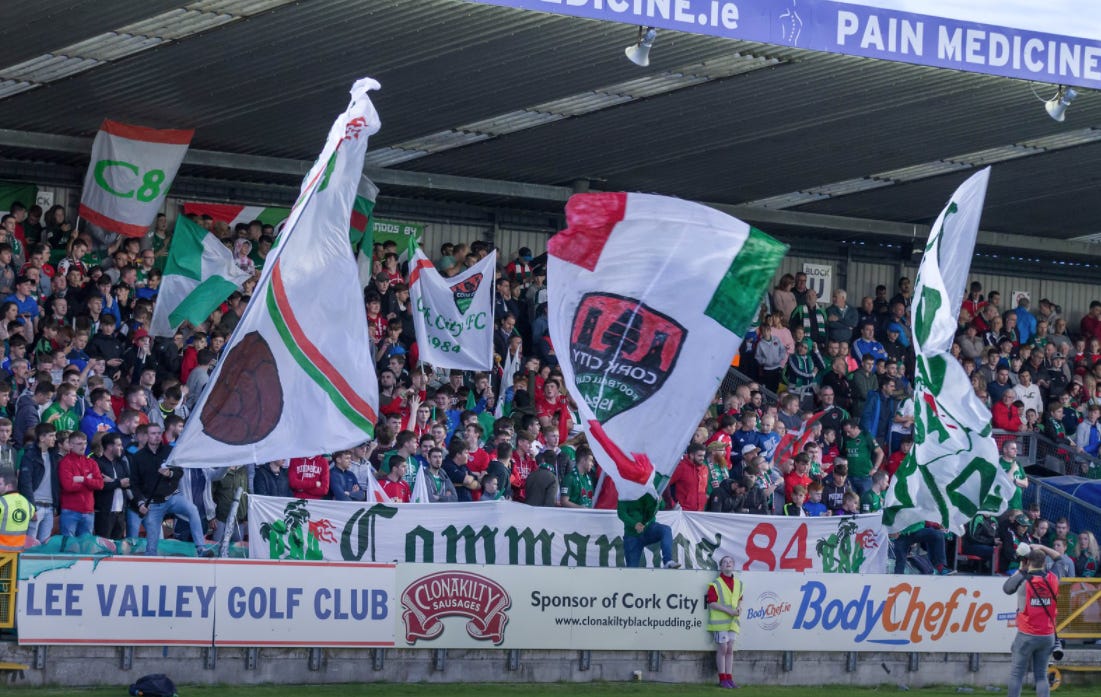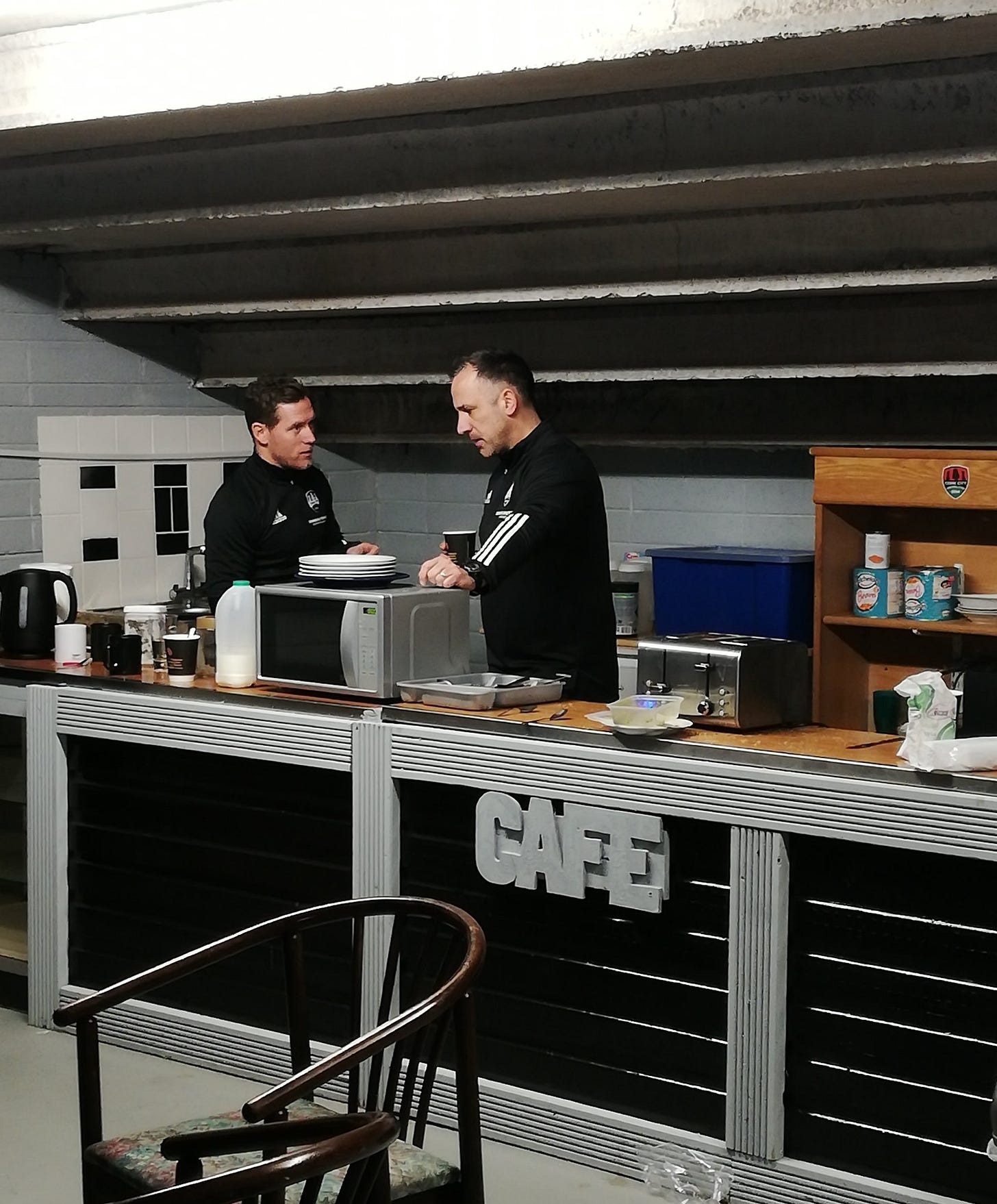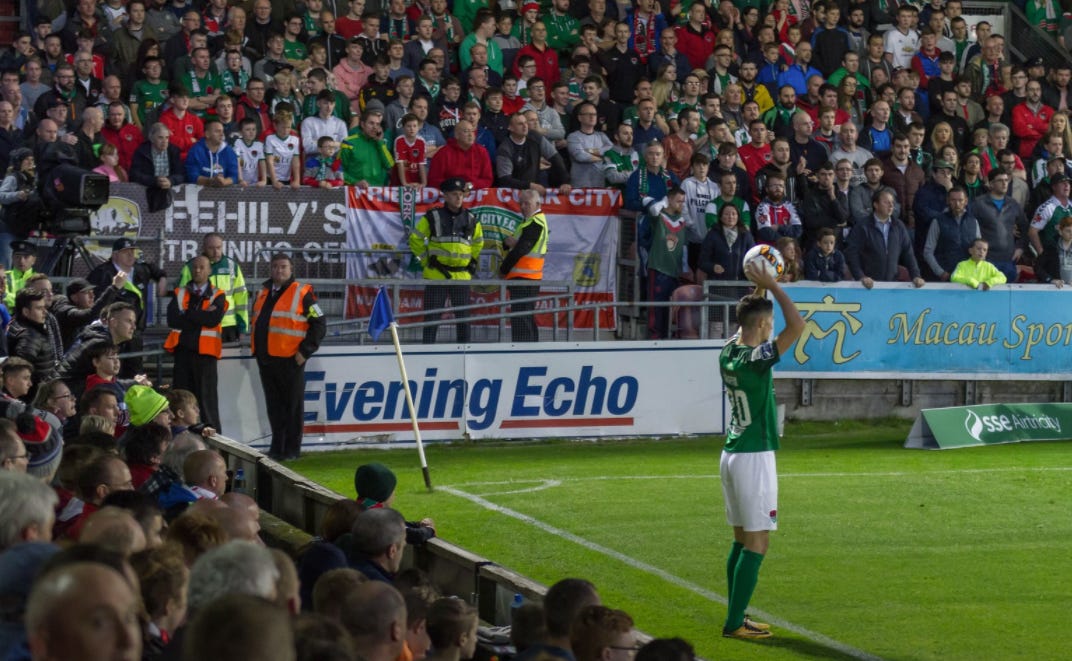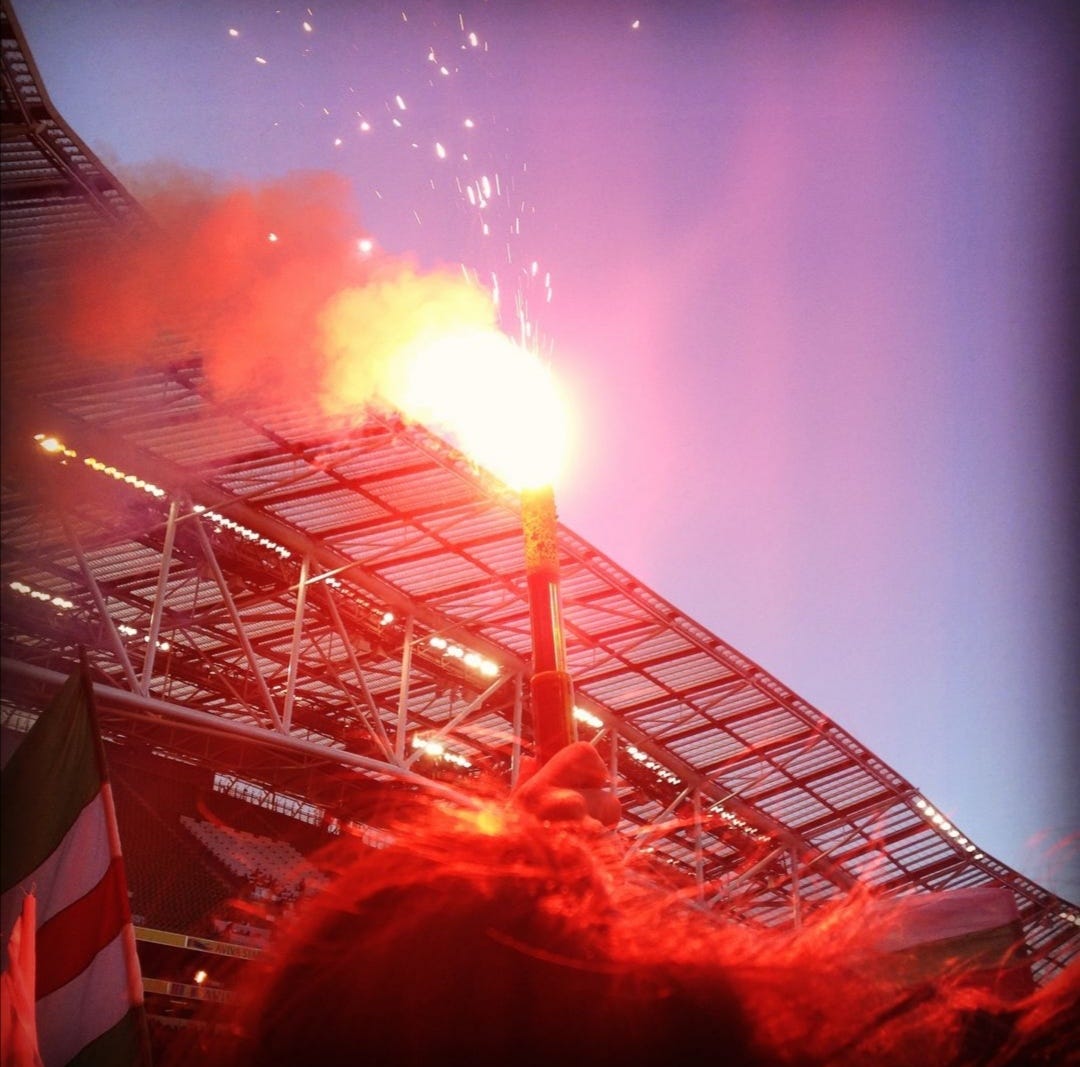Cork City FC: A club in crisis
Languishing near the bottom of the First Division, embroiled in enormous uncertainty over ownership and a club legend arguing with loyal fans in the Shed End - how did it come to this?

“The famous Cork City, Allez Allez Allez”
On the evening of July 10, 2018 Cork City welcomed Legia Warsaw to Turner’s Cross for the first leg of their meeting in the first qualifying round of the UEFA Champions League.
The Cross was baked in glorious sunshine as the two teams emerged from the tunnel and walked out onto the famous surface in front of a full house.
As the 22 players lined up in front of the Donie Ford stand, the chant from the Shed was “We are the champions of Ireland; the famous Cork City. Allez, Allez, Allez.”
The crowd fell silent - and only briefly - when the Champions League anthem bellowed from the public address system. But this was it, the pinnacle.
City, managed by John Caulfield, the club’s most capped player, and inspired by their home crowd, were brilliant that night but ultimately were beaten 1-0, with Michael Kucharczyk’s stunning long-range strike 11 minutes from time proving decisive.
There was still an enormous sense of pride that evening as the Leesiders took the game to the Polish champions. Had they taken just one or two of the many chances they created, the home side would probably have won.
But what was probably less known that night - we do have the benefit of hindsight now - is that at Cork City, cracks were starting to appear.
Champions no more
That year, Cork City were a successful fan-owned club.
They had entered 2018 winning the double: the Premier Division and FAI Cup, and the Legia Warsaw match, a Champions League qualifier, saw them playing at the highest level of club football.
Now, three years on, they are a depleted team, eking out results in the first division, since their demotion from top flight league football last season.
Their latest outing was a 0-0 draw away to Wexford, which keeps a modest gap between them and bottom-placed Wexford. With sixteen games played, the Leesiders are on 14 points, three behind Cobh Ramblers.
“Last week was the third anniversary of us being in Warsaw to play Legia in the champions league qualifiers and almost to the day we were in Ferrycarrig Park (in Wexford) involved in a battle of the bottom two in the League of Ireland First Division,” says Declan McCormack, one of the Amigos from the Cork City F.C. fan podcast “The Other Three Amigos”.
“How did that happen? Like…what has happened to this great football club that we have dropped to that position in a meagre three years?”
Declan’s diagnosis is precise: “We weren’t relegated for financial issues or anything else, we were relegated on the field of play.”
Meanwhile, behind the scenes there’s turmoil as City are unable to sell a group of players that could well be the club’s saving grace.
Cork football has a history littered with the rise and rapid fall of a number of its clubs but even this takes some beating.

An over-stocked centre-back?
Damien Delaney started at centre-back the evening of the Legia Warsaw game. He had signed ten days previously, on a free transfer from Premier League club Crystal Palace and it was heralded as quite the coup for the club - he was even referenced in the infamous tweet to Legia Warsaw -which was emblematic of the mood and hubris at the club at the time.

It was seen as too good an opportunity to pass up to sign the Douglas native and bring him back to the club where he started his professional career. The squad could avail of his experience: playing with Palace in one of the best leagues in the world, and had international caps with the Republic of Ireland.
The problem was that City were already well-stocked in defence with Sean McLoughlin and Conor McCarthy breaking through and Delaney’s best days were already long behind him.
His own goal away to Bohemians later in the season probably summed up his second spell with the Rebel Army and although he took a substantial pay cut to join City, he was still on a high wage in League of Ireland terms.
While Delaney played the full game against Warsaw, Kieran Sadlier, an attacking midfielder, was only given the final eight minutes plus stoppage time. Sadlier’s 26 goals and 13 assists earned him a move across the Irish sea and to a higher standard with Doncaster Rovers and subsequently Rotherham United - where he remains today - but for large periods of his final season with City he found himself kicking his heels on the substitute’s bench

Changes
Poor signings were only one part of the jigsaw that put pressure on the management at City. The club was roundly beaten in its brief sojurn in Europe in 2018: in the second leg of the Champion’s League, City were beaten 3-0 in the Polish capital.
This was followed by a tame exit from the third qualifying round of the Europa League at the hands of Rosenborg, who beat them 2-0 in Cork and 3-0 in Trondheim, Norway, City manager John Caulfield was coming under increasing pressure from supporters.
While City’s forays in Europe ended quickly and in failure, domestically the club were competing, but the style of football was becoming less and less enjoyable to watch.
This wasn’t the free-flowing football side from 2017 which had Sean Maguire spearheading attacks that regularly resulted with City netting three or four goals a game.
It was perhaps harsh on Caulfield that that level was expected to be maintained after Maguire joined Preston North End but the talent he had at his disposal was still capable of playing better football and that it produced during 2018.
City managed to finish second in the league table with Dundalk - arguably the greatest side in the history of Irish football - reclaiming their crown while the two rivals would go head to head in the FAI Cup final for the fourth year in a row.
Caulfield’s men had won the last two but this time it was Stephen Kenny’s charges who would claim the silverware, and the double, with a 2-1 win at the Aviva Stadium.
Then came the post-match press conference with the City boss, which looking back was telling.
“We will have to build a new team. Every year in the league of Ireland is tough when you’re constantly changing players. It’s just reality. They’re the facts, you can say what you want but they’re the facts.”
It was hardly a rallying cry or an adamant statement that City would be back the following year. It turned out to be warning, in fact.
An uphill battle
City’s objective for the 2019 season was to qualify for Europe again and to battle Dundalk for the honours, but with the budget being cut by a reported figure of €300,000, that was always going to be tough to achieve.
And so it proved. The football didn’t improve, neither did the results and after an eight-game winless run which saw them just three points above the relegation places and with attendances dropping, John Caulfield departed the managerial hot seat.
The signings of Liam Nash, Dan Smith, James Tilley, and Matthew Gillam from English clubs to replace the likes of Jimmy Keohane, Barry McNamee, Graham Cummins, and the aforementioned Kieran Sadlier simply didn’t work.
The drop in quality was too much, the money they spent was wasted and with little chance of securing European football for the following campaign, the financial situation at the club was only going to worsen.
But the change in managers was also a case of being careful for what you wish for. John Cotter was installed as interim manager until a permanent manager could be found and despite an initial boost, their style of play and the results failed to improve.
If fans thought the manner of their Europa League exit to Rosenborg was demoralising 12 months previously, their defeat to Luxembourg's Progres Niederkorn in the summer of 2019 was much worse.
Colm Horgan’s European debut lasted only 24 minutes as his two mistakes cost his side the two goals in their 2-0 defeat at Turner’s Cross.
A brave effort in the return leg a week later saw City level the scores on aggregate thanks to goals from Garry Buckley and Conor McCarthy, but Issa Bah’s finish from a tight angle in the 68th minute ensured Progres progressed.
Management issues
The most disappointing aspect of that tie is that City missed out on a massive money-making double-header against Steven Gerrard’s Glasgow Rangers in the next stage and with it a huge windfall the club could desperately have done with was gone. It would be their last European venture for a while.
Some money was earned in the sale of McLoughlin to Hull City a couple of weeks later but his presence in the heart of the defence would be sorely missed.
City also technically had two managers now with Frank Kelleher brought in ahead of the European fixtures because he had the required Uefa Pro Licence coaching badges which John Cotter was still working towards.
But by the end of August, the club finally appointed its permanent successor to Caulfield as former striker Neale Fenn was given the task of changing City’s fortunes.
Fenn was a league winner with the club in 2005 and had been earning rave reviews for the style of football he had introduced while in charge of Longford Town.
But the so-called ‘managerial bounce’ was not forthcoming as City failed to win any of their first six games with Fenn at the helm.
It wasn’t until the third-last game of the season and a victory over bottom side UCD - the first win of his reign and their first at home in five months - that Premier Division safety was assured.
They had stumbled over the line but the off-season was meant to provide Fenn with the chance to build the side in his own image but the club’s precarious financial position prevented him from doing so.
When it came to transfers it was history repeating itself: the players leaving were better than the players coming in with Conor McCormack, Karl Sheppard, and Conor McCarthy heading for pastures new.
Henry Ochieng, Joseph Olowu, and Deshane Dalling showed glimpses of their quality but with the latter two only coming in on loan, questions were asked - perhaps harshly - how desperate they really were to keep City up.
Conor Davis signed from Derry City but a groin injury meant he never made an appearance while Scott Fenwick, Connor Simpson, and Reydon Dillon’s failure to find the net meant they were moved on before the season concluded.
City now had a worse squad of players than the year before when they finished 8th with just nine wins, and 37 points from 36 games.
During a season interrupted by the Coronavirus in 2020, City managed just nine points from 13 games to leave them on the brink of relegation.
Fenn’s short reign at the helm was put to an end after their home defeat to St Patrick's Athletic which was shrouded in controversy as he made a double substitution during the first half and one of the players he replaced was winger Daire O'Connor.
A few days later, the popular winger was pulled aside after training by Fenn and was told he had no future at the club. The day after that, Fenn and assistant Joe Gamble left their roles by mutual consent.
Colin Healy was quickly appointed and had five games to save City from the drop. He couldn’t do it and for the first time in the club’s history, they were relegated to the first division for footballing reasons rather than their trials and tribulations behind the scenes like in 2010.
The former Sunderland, Celtic, and Republic of Ireland international has been using the 2021 season to blood young footballers, but he has had little choice in the matter given the lack of funds that could be made available.
City currently has talented youngsters on the books in the likes of Beineon O’Brien Whitmarsh, Cian Murphy, and Darragh Crowley but the weight of expectation that comes with playing for Cork City has been too much for them to handle.
Financially the club is in a bind, new signings are impossible so the pressure for promotion falls on the young guns, and with the mid point of the season passed, promotion is looking out of reach for this season.
But, promotion is just one battle in the war that City is fighting; there’s also the significant matter of who’s going to take City on as the new owner?

The English option
This brings us to the ownership situation, currently an open-ended question.
Since 2010, Cork City has been owned by its supporters through a supporters' trust known as FORAS (the Friends of the Rebel Army Society).
This trust elects a Board of Management to run the football club, but the major decisions must be made at Annual General Meetings or Extraordinary General Meetings and it has been like this since the trust saved the club from extinction back in 2010. That saga is a story for another day.
In the immediate aftermath of the club’s relegation in 2020, it was decided and agreed that FORAS had taken the club as far as they could and that a new and wealthier owner was required to get the club challenging at the top of Irish football once again.
On October 28, 2020, the board voted in favour of the motion to sell the club to Preston North End owner Trevor Hemmings, a British billionaire, and his company Grovemoor Limited.
Grovemoor Limited was therefore given the option to take over the club for €1 while also taking on the existing liabilities.
Just a simple majority was required on the call option agreement, but FORAS confirmed the vote was carried with a whopping 69.8% voting in favour and just 30.2% voting against.
The reason it was an overwhelming majority is because the board had communicated to its members at this time that failure to secure investment in the form of a full takeover would result in severe financial cuts across the club, particularly to the playing budget and full-time staff.
More alarmingly, there would also be a huge risk that the club would not secure a license to participate in the League of Ireland First Division for the 2021 season.
Once the motion had carried, it was hoped the club’s future was settled, but less than two months later the deal was called off due to Grovemoor’s inability to agree terms on a lease agreement with the Munster Football Association for the use of Turner's Cross.
The club then released a strongly worded statement voicing their disappointment which included the warning; “We may seek to negotiate reduced rates with the M.F.A for Turner’s Cross in line with our budget, which if unsuccessful will result in us exploring alternative venues for playing behind-closed-doors for next season.”
But Trevor Hemmings, the billionaire owner of Preston and who has strong links to Cork - he also owns Trabolgan Holiday Village in East Cork and a number of stud farms across the county - would continue to monitor the situation in the hope of reviving the deal down the line.


The two sides also have close ties.
City has proved to be a feeder club for the Lancashire side: Graham Cummins, Sean Maguire, and Alan Browne have all played at City before moving to Preston with numerous other younger players playing at academy level for Preston.
The two sides has also met in a friendly fixture, all factors which likely informed the supporters at FORAS that a deal with Grovemoor was the right step to take.
In fact, City agreeing to sell the Republic of Ireland international pair of Maguire and Browne to the Lancashire club years ago would prove to be decisive in getting the cash strapped Rebel Army a license to participate in the 2020 Premier Division when the club’s concerning financial status and Hemmings’ initial interest in helping came to light.
The day before that demoralising relegation season started, it was revealed that City had been forced to sell the sell-on clauses for Browne and Maguire, in a bid to secure funding of approximately over €500,000 to settle a huge tax bill and keep the club afloat.
At the time, the club was struggling to raise the necessary funds to offer to Revenue and the FAI to allow them to continue as a Premier Division side.
It is believed at one point they were just two hours away from going out of business and it is something they haven’t properly overcome since.
And having reared its ugly head prior to the 2020, and 2021 season, could you really rule it out being an issue again in 2022?
The only certainty is that the license they will be trying to obtain will be for the first division again and with such unrest it’s hard to predict how many fans will return through the gates when Covid restrictions have lifted. Reduced attendances will set the club back further.
Beyond the terraces, in the boardroom ownership of the club is also an unknown unknown to borrow a political phrase.
Preston club director Peter Ridsdale just this week informed the Cork City fans podcast ‘The Other 3 Amigos’ that there is no time limit on their option to buy the club despite the City board telling it’s members that there was.
He also stated how difficult Grovemoor found it dealing with the M.F.A which means the biggest stumbling block shows no signs of being cleared.
“They’re saying that they need a stadium, that they need to either buy Turner’s Cross, buy a greenfield site to build on, or get a long-term lease but that’s not happening before the off-season,” says Declan McCormack, summing up the stumbling blocks to what’s holding Grovemoor back.
From bad to…
Meanwhile, frustration with City’s poor run this season has spilled out on to the games.
Earlier this month goalkeeper Mark McNulty, a City stalwart, got in an argument with fans in the Shed shortly after City conceded two late goals to draw 2-2 at home with Bray Wanderers. His decision to punch the ball rather than catching it in the 95th minute lead to a last gasp equaliser from the visitors.
That result means this young side still have just three wins recorded from their 16 league games so far this season, which leaves them languishing at the wrong end of the table.
“The fans' feelings at the moment are one of pure and utter frustration,” says podcaster Declan McCormack.
“Frustration with what we see on the field, frustration with what we see off the field, and then we had the issues that popped up yesterday around the Grovemoor take over,” Declan says referring to the uncertainty about future ownership of the club.
Effectively the club is in limbo, and that cloud of uncertainty that has been hanging over the club is growing darker.
“So now we're left with the scenario that there is this open-ended call option that just hangs over the club, the fans, and the membership whereas a lot of us hope it’s just executed quickly,” says Declan.
It’s likely Declan echoes what many of the fans are hoping for when he says the way out of this is with quick and direct action from Grovemoor - that they come in, “put the money on the table, invest in the club and get us back up the table, get us back into the Premier Division and get us challenging again for leagues and Europe.”
But, equally he’s realistic about those chances.
“But that just seems so far away now. There is a real possibility that the whole thing could go pear-shaped and we could drop even further than we’ve dropped already.”
“It’s hard to think about but there is a strong possibility that we end up as a part-time amateur club which within five years of having won a double would be an absolutely catastrophic fall from grace.”
One of the core aspects of being a fan is the investment you put in: time, energy, money, but also there’s the returns that run from the magical moments of witnessing something beautiful on the field to the communal joy of celebration in the stands.
For the Cork City fans who own the club, the despair is all the more hard to take.
“It’s just been a disaster and the saddest and the most frustrating thing is it’s we the supporters, we the fans who own the club have done this to the club. That frustration is an absolute killer,” says Declan.
Relegation for Cork City was supposed to be rock bottom, a chance to press the reset button to help them rise again. But now they are not even competing in the first division...they’re ninth out of ten teams.
Things have never been as bleak for Cork’s most famous football club.






